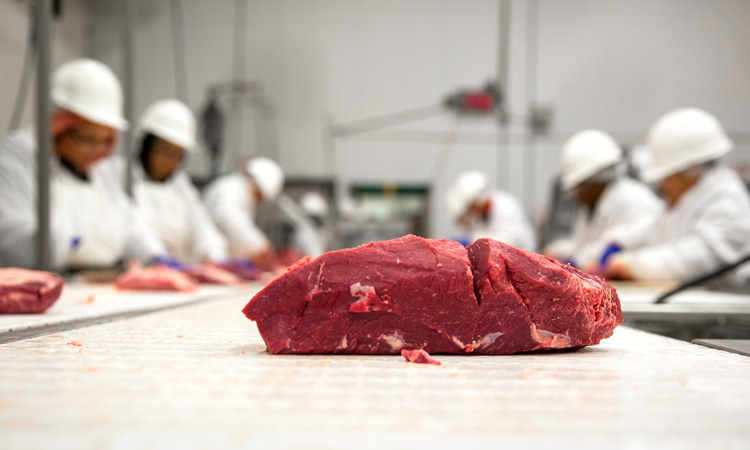BMPA lays out Brexit concerns that could “seriously disrupt trade”
- Like
- Digg
- Del
- Tumblr
- VKontakte
- Buffer
- Love This
- Odnoklassniki
- Meneame
- Blogger
- Amazon
- Yahoo Mail
- Gmail
- AOL
- Newsvine
- HackerNews
- Evernote
- MySpace
- Mail.ru
- Viadeo
- Line
- Comments
- Yummly
- SMS
- Viber
- Telegram
- Subscribe
- Skype
- Facebook Messenger
- Kakao
- LiveJournal
- Yammer
- Edgar
- Fintel
- Mix
- Instapaper
- Copy Link
Posted: 2 June 2020 | Sam Mehmet (New Food) | No comments yet
The British Meat Processors Association (BMPA) has urged for the UK government to take immediate action to avoid future trade complications.


There are two types of issue that need to be urgently addressed by government – technical and general – if the UK is to be prepared for Brexit at the end of 2020 and if it is to avoid serious disruption to trade, according to the British Meat Processors Association (BMPA).
While some progress has been made on import and export processes, there are still several key issues that remain unresolved, the trade body explained, which reportedly have the capacity to completely halt trade of certain goods to the EU and possibly even other regions.
Technical
Health / ID marking
BMPA explained that the working assumption is that the health mark ‘UK’ may still be retained if a wide-ranging Free Trade Agreement (FTA) is reached with the EU. This could include a negotiated agreement to continue to use ‘UK’ rather than the standard requirement that the EU has for third countries to use the ISO standard – ‘GB’.
In the absence of a deal, the UK will need to use the ‘GB’ mark for trade with the EU, and BMPA said it makes “little sense” to have a different mark for trade with other markets.
The British meat industry body urged for clarity as soon as possible as to which way this will go and how soon the UK can move to the ‘GB’ mark if that is required.
Groupage
The government has released guidance on groupage – the collective shipping of different cargo – which, in the case of the meat industry, is only applicable to premises that are not producing fresh meat. BMPA suggested that this is not clear, and requested clarity on the protocols or procedures for grouped or mixed loads containing fresh or frozen meat or meat products.
“If UK operators exporting fresh and frozen meat can no longer use groupage, they will be at a very significant competitive disadvantage,” BMPA wrote in a statement.
Export certification
As a member state and during the transition period, the UK is exempted from having to provide export health certificates (EHC). At the end of the transition period this will cease, and the UK will have to complete and provide EHCs.
BMPA explained that this is “relatively straightforward” for fresh and frozen meat where there are standard EHCs, but for certain products such as fresh meat preparations or mince, there are currently no EHCs for imports into the EU from no- EU countries.
In light of this, BMPA stressed that “it is essential that, regardless of the FTA discussions, the UK attempts to secure agreement on EHCs, bearing in mind there is mutual interest in doing so.”
BMPA also outlined a number of general concerns:
- The UK needs to establish urgently whether the EU will grant 3rd country approval after 31 December. Without this, it will not be able to export meat to the EU
- For trade with the European Union, the UK needs a zero tariff on imports and exports to stay competitive. As well as needing a zero tariff on exports of meat, we also have concerns over import tariffs on food manufacturing equipment used in processing here in the UK, most of which is made in Germany
- For goods leaving the UK, we need minimal checks that cause minimal delays to logistics
- For goods coming into the UK from Europe, government has now said that it will be carrying on checks at the border. This was not the case previously. We need to know what is meant by ‘checks’ in this case
- We also need to know what the arrangements are for health certificates on imports from the EU
- A streamlined online documentation process requiring minimal office administration, and quick veterinary approval and signatures would be required to minimise disruption
- We should not allow products that do not meet current UK food safety, welfare and environmental standards to enter the country post-Brexit
- Government has failed to write these safeguards into the recent Agriculture Bill
- The British meat industry relies on immigrant workers because it is difficult to get UK nationals to take up certain positions. As a minimum, we would ask government to allow foreign workers six months seasonal access.
Related topics
Food Safety, Recruitment & workforce, Regulation & Legislation, Supply chain, Trade & Economy









